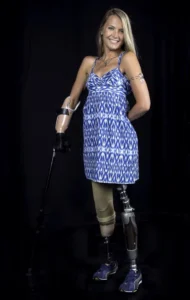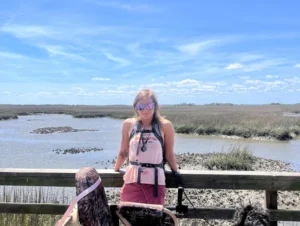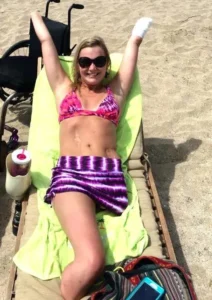Note: we are republishing this story which originally made the news in June 2016.
Four years after a harrowing battle with flesh-eating bacteria that took her hands, leg, and foot, Aimee Copeland is embracing her new self with confidence. In a recent Facebook post, Copeland shared a photo from her vacation in San Juan, Puerto Rico, where she can be seen enjoying the beach, scars and all.
 Photo Credit: Aimee Copeland/Facebook
Photo Credit: Aimee Copeland/Facebook
In her heartfelt post, Copeland expressed, “It’s been a journey to find comfort and acceptance in my new body. We all have imperfections that make us unique, and there’s genuine beauty in our flaws. Scars and the strength to heal build character! It’s not about what you possess – it’s about making the most of what you’ve got that truly matters.”
 Photo Credit: Aimee Copeland/Facebook
Photo Credit: Aimee Copeland/Facebook
The saga of Copeland’s courage commenced in May 2012 when, at the age of 24, she embarked on a fateful adventure – a makeshift zip line ride over the Little Tallapoosa River, situated about 50 miles from Atlanta. A sudden line snap led to a wound on her calf that seemed inconsequential initially but turned into a life-threatening predicament. She contracted necrotizing fasciitis, an aggressive flesh-eating infection caused by the bacteria Aeromonas hydrophila.
Her health deteriorated rapidly, and she confronted the harrowing reality of multiple organ failure. Copeland required a respirator to breathe and was in full-time dialysis due to her kidneys failing. Her heart struggled to pump blood, with an ejection fraction of only 10% compared to the typical 55% to 75%.
 Photo Credit: Aimee Copeland/Facebook
Photo Credit: Aimee Copeland/Facebook
In an agonizing decision, surgeons had to perform amputations on her hands, a leg, and a foot. Copeland’s struggle epitomizes the severity of necrotizing fasciitis, a rare but dangerous condition that attacks healthy tissue and can be fatal in approximately 20% of cases, according to the Centers for Disease Control and Prevention.
The bacteria that cause the disease are widespread in the environment and usually lead to minor infections. However, when they enter the bloodstream through an opening like a cut, doctors must take drastic measures to prevent the spread of infection.
 Photo Credit: Aimee Copeland/Facebook
Photo Credit: Aimee Copeland/Facebook
Today, Copeland stands as a symbol of resilience, demonstrating that adversity can be transformed into empowerment. In her pursuit of healing, she has embraced her role as an advocate for individuals with disabilities. Copeland’s story serves as a beacon of hope, encouraging others to face challenges head-on and find strength in their own unique journeys.
Sources: CNN